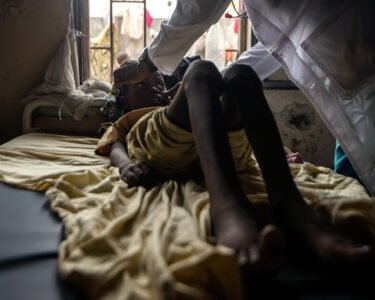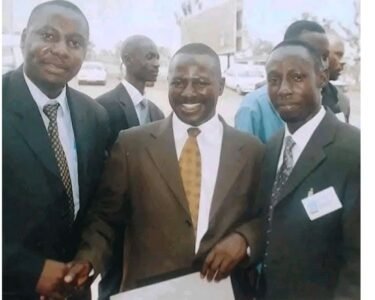The Kampala Capital City Authority (KCCA) Council has made a groundbreaking decision to partner with local investors to upgrade the city’s drainage channels, aiming to end the perennial flooding crisis.
This move comes after Lord Mayor Erias Lukwago accused businessman Dr. Hajji Hamis Kiggundu and former Acting Executive Director Frank Nyakana Rusa of illegal activities related to the Jugula drainage channel reconstruction near Nakivubo.
Lukwago claimed the project caused recent devastating floods in Kampala and demanded Rusa’s interdiction from his current role as Director of Legal Affairs.
However, the KCCA Council dismissed Lukwago’s accusations as “politically charged and legally unsound.” Official records presented during the council session revealed that Ham Enterprises (U) Ltd., Dr. Kiggundu’s company, had submitted and received approval for the construction plans on December 9, 2024, by KCCA regulations.
The Council emphasized that partnering with the private sector under close KCCA supervision is the only viable path to ending the city’s chronic flood disasters.

Lukwago, who has long positioned himself as a fierce critic of city developers, had accused Dr. Kiggundu of illegally reconstructing the Jugula drainage channel near Nakivubo, alleging it caused the devastating floods that recently crippled Kampala.
He further implicated Frank Nyakana Rusa, demanding his interdiction from the office of Director of Legal Affairs, claiming he backed the project while serving as Acting Executive Director between September and December 2024.
The council, however, was in no mood for theatrics. Members tabled official records showing that Ham Enterprises (U) Ltd., the company owned by Dr. Kiggundu, had submitted all construction plans to KCCA by law. The plans were reviewed and approved on December 9, 2024.
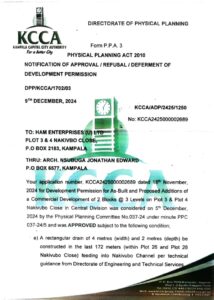
It was revealed that the charges Lukwago cited had not only been dismissed by the KCCA magistrate court on January 14, 2025, but had been wrongly filed against Dr. Kiggundu personally, rather than his company—violating the legal principle of limited liability.
Councillors described the charges as malicious, biased, and legally irregular. They criticized Lukwago for consistently promoting personal vendettas instead of offering leadership grounded in facts and development priorities.
His conduct was labeled unprofessional, with members pointing out that the actual cause of floods across the city stemmed from years of neglect, poor solid waste disposal in open drainages, and the lack of modern infrastructure—not the efforts of developers like Ham Enterprises, who are working to fix these problems.
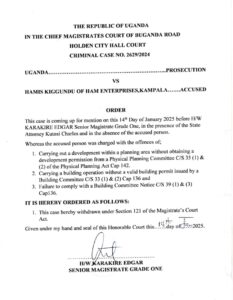
It was revealed that the charges Lukwago cited had not only been dismissed by the KCCA magistrate court on January 14, 2025, but had been wrongly filed against Dr. Kiggundu personally, rather than his company—violating the legal principle of limited liability.
Councillors described the charges as malicious, biased, and legally irregular. They criticized Lukwago for consistently promoting personal vendettas instead of offering leadership grounded in facts and development priorities.
His conduct was labeled unprofessional, with members pointing out that the actual cause of floods across the city stemmed from years of neglect, poor solid waste disposal in open drainages, and the lack of modern infrastructure—not the efforts of developers like Ham Enterprises, who are working to fix these problems.
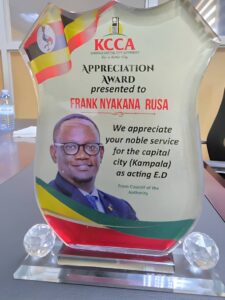
Drawing comparisons with modern cities that have invested in underground drainage, the council emphasized the need to shift away from Kampala’s outdated open channels, which are prone to blockage by solid waste.
Members warned against politicizing development efforts and called for unity in advancing Kampala’s progress. They stressed that KCCA’s mandate is to serve all Ugandans holistically, not to be driven by personal emotions or political rivalries. The council also issued a passionate call to government entities to support, rather than frustrate, local investors who can solve real urban challenges.
The events of April 3 left no doubt about where the council stands. While Lukwago walked in seeking to indict others, he walked out politically bruised, his credibility shaken by a united council determined to focus on solutions rather than blame.
As Kampala looks to the future, the city may finally be turning a corner—one paved not with finger-pointing, but with partnership, progress, and homegrown leadership.



